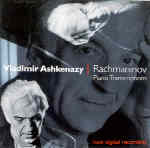Rachmaninov’s transcriptions largely date from his concert-giving years, and it is likely that he tailored their considerable difficulties to suit his own massive, infallible hands. Vladimir Ashkenazy’s smaller hands, however, easily negotiate these challenging yet sumptuous concoctions. Notice the Midsummer Night’s Dream Scherzo’s silken double notes, the shapely lyricism Ashkenazy brings to the composer’s exquisite Lilacs and Daisies, or Wohin’s shimmering chromatic filigree. The Kreisler Liebeslied and Liebesfreud remind me of the composer’s similarly fleet, poker-faced versions; but Idil Biret’s slower tempos and greater dynamic heft in the latter allow the music’s dense harmonic activity more breathing space.
Some listeners may prefer Horowitz’s juicier Polka de V.R., or Biret’s sharper, more characterized articulation in the Flight of the Bumble Bee (just as colorful, but less pedaled), and Biret’s broader, weightier way with the Star-Spangled Banner transcription also contrasts to Ashkenazy’s more upbeat rendition (he’s playing to the ballpark, she’s playing for heads of state). Ashkenazy joins his son Vova for the six Op. 11 pieces (the duetists sound as one, as it should be), and his wife Dódy joins in for six-handed fun in the Waltz and the Romance. Alastair Mackie admirably handles the Italian Polka’s quirky little trumpet interventions. In all, a major addition to Vladimir Ashkenazy’s distinguished Rachmaninov legacy.
































